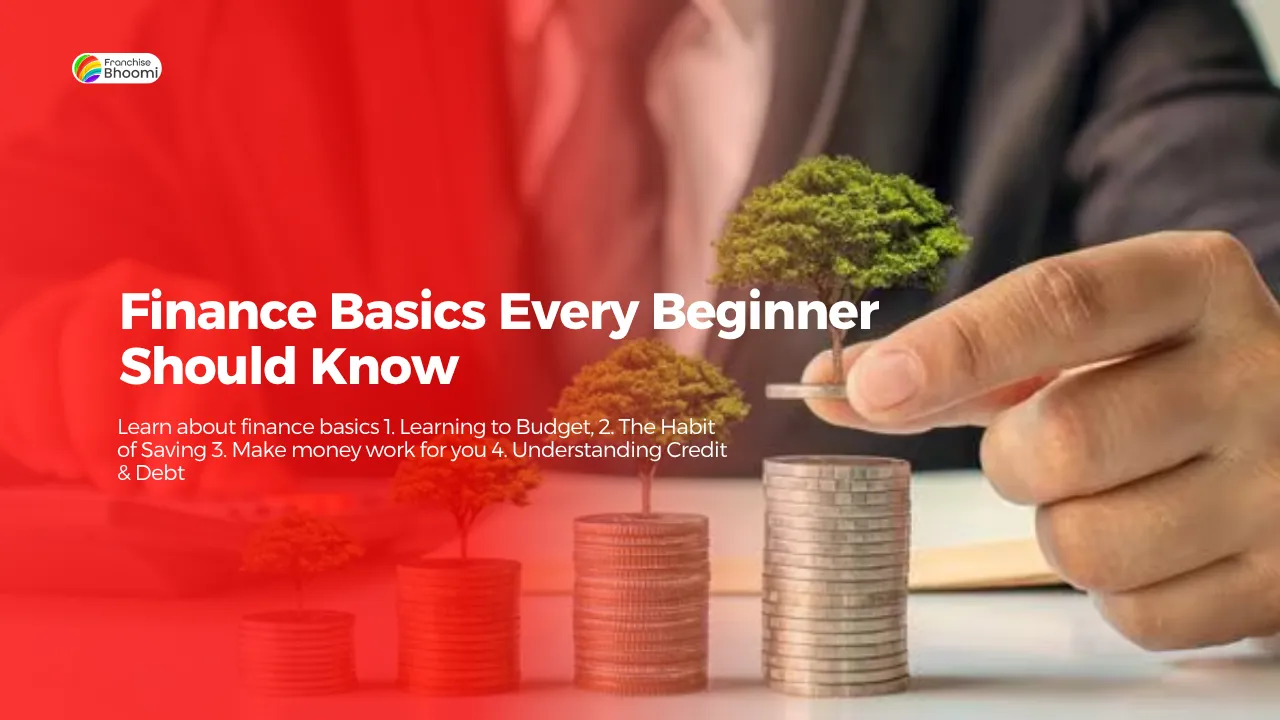Have you ever looked at your wallet at the end of the month and felt like, “Where did all of my money go?” Most of us have been in the situation, right? When we start earning, we all feel excited; we will start buying what we like, spending money for food, hanging out with friends, and saving a little bit here and there. But when we think about the money, it seems to slip away faster than we expect. It may be time to understand the need for finance, not just as numbers, but as a way of life. (Everyone need to finance basics)
Learning finance is not like becoming an expert overnight. It is like taking a small, meaningful step to monitor where your money goes and how. In this blog, I will take you through a simple story of financial growth, from confusion to conclusion. And here we are going to discuss six of the most important basics of finance every beginner should know.
Let’s begin of finance basics!
1. The Realization: Where Does My Money Go?
It often begins with a small moment, like checking your bank balance at the end of the month and realizing that it’s almost gone. Now you started recalling where it went, like on just a few online orders, a dinner with friends, and buying some dresses. But somehow it all adds up, and you’re left wondering, “I didn’t even spend it on something big, so how did it disappear so quickly?”
That’s the first realization: money slips away quietly when we don’t keep our eye on it. Most of the beginners make this mistake, as they feel saving money is something only the adults and rich people can do. But the reality is that saving starts the day when you start earning or spending. Understanding your expenses is like turning on the lights in the dark room. Once you start, you notice where your money goes, like the unnecessary subscription, small daily expenses, or emotional shopping. This is not about the guilt, and it is about the awareness. The simple realization is the first step towards financial control, because you can’t manage what you don’t measure.
What You Can Do
- Track all expenses consistently
- Maintain a record
- Analyze your spending
- Detect hidden or unnecessary expenses
- Set clear spending goals
Also Read this: 5 Things to know Before Starting up your Franchise
2. The First Step: Learning to Budget
Budgeting is a crucial step for anyone looking to gain control over their finances. It can be your biggest helper to track where your money is spent. And the easy way to budget is dividing them into 3 categories: needs (essential expenses like rent, bills, and groceries), wants (discretionary spending such as dining out or entertainment), and savings (funds set aside for emergencies and future goals).
Such allocation will help you track spending behaviour, see which expenditures are unnecessary and to make effective financial decisions. To know the budget, it is counselable to use the tools such as spreadsheets or apps, and check your budget and assess it periodically, The practice of this will always make you become financially disciplined, and vital costs are met.
3. The Turning Point: The Habit of Saving
There comes a moment in everyone’s life, and that will be the turning point. The point is when we realize that spending without saving only brings short-term joy. Imagine a moment when you need money for an emergency expense, but you don’t have enough money. That moment changes everything. Developing the habit of saving turns chaos into control and worry into confidence. It’s not about how much you earn, but how much you keep aside for your dreams.
Why saving is your turning point:
- Gives you financial security and peace of mind
- Builds confidence to handle any situation
- Helps achieve long-term goals without stress
Easy ways to begin:
- Start with small, consistent amounts
- Set a specific goal for motivation
- Track expenses and cut unnecessary ones
- Treat saving as a non-negotiable habit
4. The Curiosity: What If My Money Could Grow?
Have you ever looked at your savings and wondered, “Could this money actually grow on its own?” This is where the actual financial awareness truly begins. Smart money habits always begin with curiosity. Even saving or investing ₹500 or ₹1000 a month can compound into a significant sum over a few years. Staying consistent, tracking your progress, and gradually increasing your contributions as your comfort level grows is a great trick. Curiosity naturally creates habits that turn money from a passive asset into a growing resource when you allow it to direct your financial decisions. It’s not only about making money; it’s also about gaining self-assurance, financial stability, and future independence.
You transition from earning to accumulating wealth when you begin to consider how your money can benefit you. The goal is to make your money wiser every day, not to get rich overnight.
Practical ways to grow your money:
- Open a high-interest savings account for idle cash
- Start a monthly SIP in mutual funds, even with small amounts.
- Consider recurring deposits or fixed deposits for safe, predictable growth.
- Track your expenses and review your goals monthly.
- Automate savings and investments to remove forgetfulness
- Reinvest earnings to benefit from compound growth.
- You can start Government backed franchise business
Also Read this: Top Government Franchise Opportunities in India for 2024
5. The Caution: Understanding Credit and Debt
Credit and debt are weapons with enormous power, which may or may not make or destroy your financial condition when misused. Provided you spend your credit wisely, you will be able to achieve such significant purposes as buying a house, financing your education, and managing emergencies. However, in cases where debt is not well managed, it can also get out of control, resulting in excessive payments, no payments, and a huge financial burden on you, which are negative consequences for your mental health. It is important to know the difference between good and bad debt, to know whether you can repay debt or not, and to use credit as an instrument and not a crutch.
Key points to keep in mind:
- Only take out loans that you can actually pay back.
- Make it a priority to pay off credit card debt in full to prevent interest.
- Keep track of all debts and their due dates.
6. The Future: Planning for Long-Term Security
As we approach the end of your financial journey, the emphasis switches from learning to practical activities that secure long-term security. Making little, regular actions that gradually increase stability, self-assurance, and independence is more important than making big, bold judgments when it comes to future planning. The correct behaviors today build a safety net for tomorrow, whether that safety net is for crises, retirement, or your life goals.
- Get started early
- Maintain an emergency fund
- Diversify your investments
- Protect yourself
- Track and modify
- Avoid unnecessary debt
Also Read this: How to start India Post office Franchise in India | Start Post office Franchise
The journey doesn’t end with knowing what to do it ends with taking consistent action. By following these steps, you turn financial knowledge into security, ensuring your future is not just safe but full of opportunities. Your efforts today are the foundation for a life of freedom, confidence, and peace of mind.
Conclusion
Finance isn’t just about handling money; it’s about shaping the life you want. Each lesson you have learned, from saving wisely to managing credit and planning for the future, builds the foundation for long-term independence and confidence. The truth is, financial success is not about becoming rich overnight and not about perfection; it is about consistency and curiosity. The more you earn, the smarter your decisions become. You don’t need to be perfect; even a bit of effort can change everything.
So, let this be your turning point. Keep exploring, keep learning, and keep believing that you can design your financial story. The best investment you’ll ever make is in understanding how money works because when you master that, you master your future.
FAQ on Finance Basics
Saving means putting money aside for short-term needs, usually in a safe account. Investing is using your money to grow over time, typically for long-term goals, like retirement or wealth building.
A good rule of thumb is to save at least 20% of your income, but start small if needed — consistency matters more than the amount.
An emergency fund is money set aside for unexpected expenses, like medical bills or urgent repairs. It prevents you from falling into debt during tough times.
Credit allows you to borrow money for short-term needs, like credit cards or loans. Using it responsibly helps build your credit score; misuse can lead to debt.
Good debt helps you build assets or increase earning potential (like education or home loans). Bad debt is for non-essential spending and usually comes with high interest.
Mutual funds pool money from many investors to invest in stocks or bonds. SIPs (Systematic Investment Plans) allow you to invest a fixed amount regularly, making it easier to grow wealth.
Insurance protects you and your family from financial risks, like health emergencies or accidental losses. Health and life insurance are essential for long-term security.
A credit score shows your reliability in repaying debts. A good score helps you get loans at lower interest rates and improves financial credibility.
Start small with SIPs, recurring deposits, or low-cost mutual funds. Consistency and patience are more important than investing large amounts at once.
Regularly—ideally once a month. Reviewing helps track spending, savings, and investments and ensures you’re on track to meet your goals.




